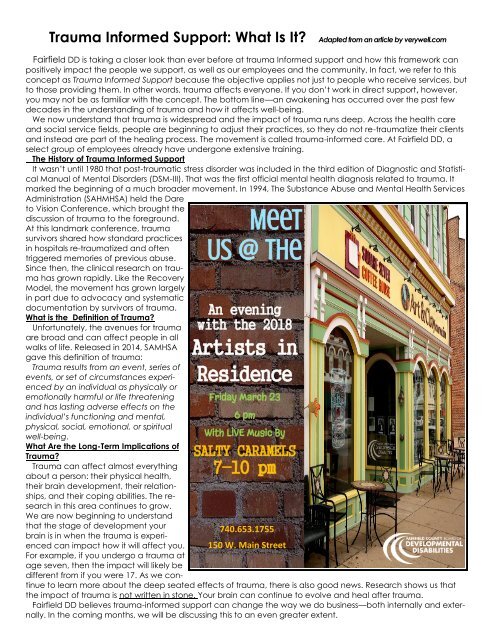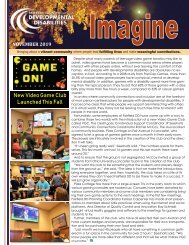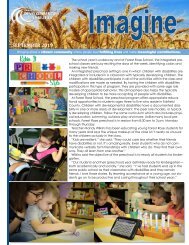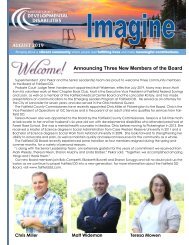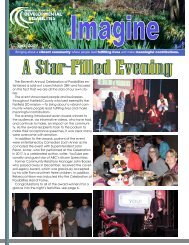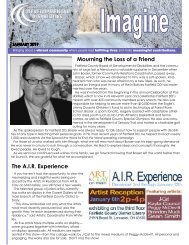february_2018
Create successful ePaper yourself
Turn your PDF publications into a flip-book with our unique Google optimized e-Paper software.
Trauma Informed Support: What Is It? Adapted from an article by verywell.com<br />
Fairfield DD is taking a closer look than ever before at trauma Informed support and how this framework can<br />
positively impact the people we support, as well as our employees and the community. In fact, we refer to this<br />
concept as Trauma Informed Support because the objective applies not just to people who receive services, but<br />
to those providing them. In other words, trauma affects everyone. If you don’t work in direct support, however,<br />
you may not be as familiar with the concept. The bottom line—an awakening has occurred over the past few<br />
decades in the understanding of trauma and how it affects well-being.<br />
We now understand that trauma is widespread and the impact of trauma runs deep. Across the health care<br />
and social service fields, people are beginning to adjust their practices, so they do not re-traumatize their clients<br />
and instead are part of the healing process. The movement is called trauma-informed care. At Fairfield DD, a<br />
select group of employees already have undergone extensive training.<br />
The History of Trauma Informed Support<br />
It wasn’t until 1980 that post-traumatic stress disorder was included in the third edition of Diagnostic and Statistical<br />
Manual of Mental Disorders (DSM-III). That was the first official mental health diagnosis related to trauma. It<br />
marked the beginning of a much broader movement. In 1994, The Substance Abuse and Mental Health Services<br />
Administration (SAHMHSA) held the Dare<br />
to Vision Conference, which brought the<br />
Meet<br />
Us @ The<br />
An evening<br />
with the <strong>2018</strong><br />
Artists in<br />
Residence<br />
Friday March 23<br />
6 pm<br />
With LIVE Music By<br />
SALTY CARAMELS<br />
7—10 pm<br />
740.653.1755<br />
150 W. Main Street<br />
discussion of trauma to the foreground.<br />
At this landmark conference, trauma<br />
survivors shared how standard practices<br />
in hospitals re-traumatized and often<br />
triggered memories of previous abuse.<br />
Since then, the clinical research on trauma<br />
has grown rapidly. Like the Recovery<br />
Model, the movement has grown largely<br />
in part due to advocacy and systematic<br />
documentation by survivors of trauma.<br />
What is the Definition of Trauma?<br />
Unfortunately, the avenues for trauma<br />
are broad and can affect people in all<br />
walks of life. Released in 2014, SAMHSA<br />
gave this definition of trauma:<br />
Trauma results from an event, series of<br />
events, or set of circumstances experienced<br />
by an individual as physically or<br />
emotionally harmful or life threatening<br />
and has lasting adverse effects on the<br />
individual’s functioning and mental,<br />
physical, social, emotional, or spiritual<br />
well-being.<br />
What Are the Long-Term Implications of<br />
Trauma?<br />
Trauma can affect almost everything<br />
about a person: their physical health,<br />
their brain development, their relationships,<br />
and their coping abilities. The research<br />
in this area continues to grow.<br />
We are now beginning to understand<br />
that the stage of development your<br />
brain is in when the trauma is experienced<br />
can impact how it will affect you.<br />
For example, if you undergo a trauma at<br />
age seven, then the impact will likely be<br />
different from if you were 17. As we continue<br />
to learn more about the deep seated effects of trauma, there is also good news. Research shows us that<br />
the impact of trauma is not written in stone. Your brain can continue to evolve and heal after trauma.<br />
Fairfield DD believes trauma-informed support can change the way we do business—both internally and externally.<br />
In the coming months, we will be discussing this to an even greater extent.


